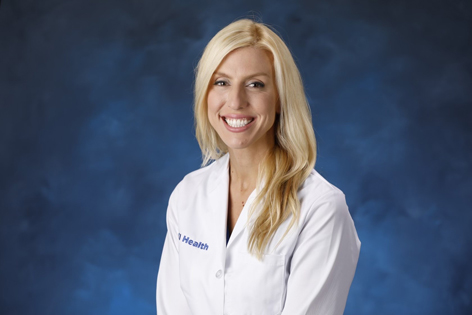 |
Dr. Megan Osborn in the Department of Emergency Medicine: Educating Educators, Residents, and Students
By Konnor Davis, UCI School of Medicine
Dr. Megan Boysen Osborn’s interest in emergency medicine began on her first day of medical school when she met Dr. Chris Fox (current Emergency Department Chair) who was teaching ultrasound to the eager group of first year medical students, including her. Inspired by his work in ultrasound and medical education, it was an easy decision for Dr. Osborn to follow in his footsteps and pursue a career in academic emergency medicine. Now, she serves as an Associate Professor of Clinical Emergency Medicine for UC Irvine (UCI) Health as well as Associate Dean for Students at the UC Irvine School of Medicine (UCISOM).
Dr. Osborn completed her medical degree and residency (including being Chief Resident) in Emergency Medicine (EM) here at UCI. She then completed an Academic and Administrative Emergency Medicine fellowship at Stanford University. Beginning during her fellowship, Dr. Osborn also obtained a Master of Health Professions Education (MHPE) degree from the University of Illinois, Chicago. Following the completion of her fellowship, Dr. Osborn returned to Irvine to serve as faculty and has remained passionate and devoted to medical education.
As a department at an academic institution with a residency program and multiple fellowship opportunities, the EM department at UCI is committed to graduate medical education. More than simply having a bustling and successful residency program, it is the quality of the teaching that sets the program apart. There are currently 4 faculty members with advanced degrees in education, with 3 more in training as we speak. The number of physicians pursuing advanced educational degrees is a testament to the leaders within the department encouraging others and providing a platform to pursue these opportunities.
The didactic curriculum for residents utilizes innovation wherever possible. For example, it is one of the first programs in the nation to incorporate escape rooms, team based learning, and interactive games (e.g., the online game-based learning platform, Kahoot) into the grassroots of resident education. Dr. Osborn recalls a particular conference that fell on July 4th in which all of the didactics remained the same, but the location was adjusted to be poolside. The program not only teaches about medicine, but it also teaches the residents about how to engage learners, thus passing down the up-to-date educational knowledge and strategies that many members of the department possess.
The EM department is also actively involved in undergraduate medical education through the teaching of medical students at UCISOM. It is important to note that a large proportion of the EM department serves as Associate Deans within the SOM (e.g., Dr. Jeffrey Suchard who serves as Associate Dean of Basic Science Education & Dr. Warren Wiechmann as Associate Dean of Clinical Science Education). Dr. Osborn points out, anecdotally, that she is seeing a trend in more EM physicians taking on positions in medical education leadership, including serving as Deans. The department is heavily involved in individual mentorship, research guidance, assisting in many student interest group events and meetings, teaching students during their required Patient-Centered Clerkship, teaching of medical student simulation and Clinical Foundations (‘“Doctoring”) courses, and even teaching entire courses during the two-year pre-clerkship curriculum. If you ask Dr. Osborn, the reason why so many department members are involved in undergraduate medical education can be summarized in one word: passion.
Dr. Osborn describes passion as the number one quality that enables a physician to excel as an educator. For many, there may be an inherent drive to teach. However, that drive must also be coupled with the passion and drive to pursue formal training in education such as serving as chief resident or pursuing medical education fellowships. These opportunities allow physicians to experience educational techniques they’ve never been exposed to while collecting their own arsenal of techniques, instructional designs, and education theories.
For herself, Dr. Osborn’s favorite things about teaching residents involve supervising at the bedside as well as digging deep into didactic lectures. Dr. Osborn describes residency learning as “putting those last little pieces together and getting things to truly click during the application of baseline knowledge as it translates to the bedside.” Dr. Osborn also thoroughly enjoys teaching medical students as their eagerness to learn is infectious and that their excitement, coupled with the inherent excitement within an emergency department, creates an excellent educational environment.
The UCI emergency department is committed to practicing, innovating, and optimizing medical education from medical students, to residents, and even their own colleagues.
